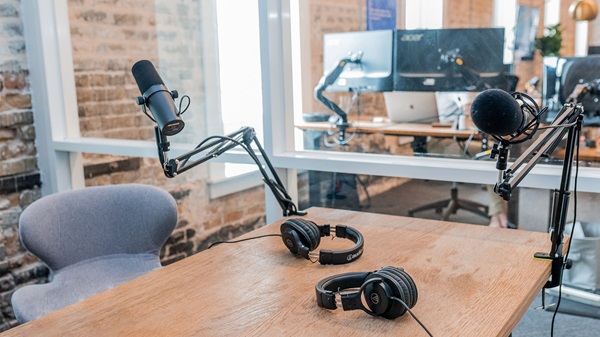You don’t have to be famous to be interviewed on tv, radio or a podcast. In fact, most people these days aren’t.
If you are asked to be an interview guest, would you know what to do? If not, here are a few things to help you be a great guest on a podcast, radio, or television program.
Before the Interview
Whether you pursued the opportunity or it came to you, it’s important to familiarize yourself with the program on which you will be airing. Listen to a few podcasts or radio programs; watch a few episodes of the television program. Know the host’s name, how to pronounce it and have an idea of their interview style. Some programs may request a pre-interview. If so, make sure to prepare appropriately. Treat the pre-interview as seriously as the real deal.
You may be asked to submit a list of talking points or questions for the host. You can also proactively submit a list to your booking contact even if not asked to ensure that they have your priority message points. If possible, present these in the form of tips or numbered suggestions that are relevant to the topic at hand. Even if your primary purpose is to promote your church, ministry or book, you should not veer off the topic you have been asked to address. Allow the host to provide the plug.
If you are going to be on television, ask your host about what type of clothing you should wear. If online, still dress from head to toe as if you were in person to avoid any video panning embarrassments. Beware of overdoing make-up. It’s better to have too little and be asked to put on more than for the audience to be distracted because you are wearing too much. If using props during your interview, make sure they are in good condition and know how/where they will be placed. For example, if you will be holding a book, you will want one with a pristine cover, and it should be placed in your lap or on a table nearby facing forward so that the audience can read the title/print.
Many radio and podcast interviews take place from the comfort of the guest’s home or office. If that’s the case for your interview, make sure that you prepare your space. Your host (or another representative) will tell you what you need. Generally, a quiet space and a great phone/internet connection are all that’s necessary. Use a landline phone when possible. Headphones and a quality mic are great to have but aren’t mandatory.
Remove all possible distractions including pets, children and phones or other devices that might ring or ding. Include the date and time of the interview, or when it will be broadcast, and not to knock or interrupt. While it’s not required, you may want to close the curtains and drape towels or blankets over desks and other hard surfaces to improve sound quality.
If video is being used, check the visible background. Be mindful to close closets, take clothing off doorknobs and shut cabinets. Remove political signage and anything that may be in contrast with your message or the media outlet's beliefs and audience.
The week prior to your interview, promote the event within your church and on your social media channels. Include the date and time of the interview and how the audience can tune in. Make arrangements for someone to record the segment as most media no longer provide recordings for guests. For radio and podcast interviews, prepare your notes. Make them easy-to-read and limit them to one or two pages that can be set in front of you. Avoid turning pages or flipping through notes to find an answer.
The Day of the Interview
The day of the interview, drink water, but avoid gassy foods, coffee and dairy products. They can cause cottonmouth and other bodily noises that are noticeable in a recording. Arrive at your destination early (even if it’s in your own home). Recheck equipment that you will be using, go to the bathroom and then allow yourself a few minutes to settle down. Take deep breaths and mentally prepare. Finally, before the recording actually begins, confirm (again) that you know the host’s name (how to refer to them on the air) and that your host knows how to pronounce your name and that they have your correct contact information that will be shared with the audience.
During the interview, allow the host to take the lead. Pause briefly after each question in order to avoid talking over your host. Never interrupt or attempt to answer a question before the host has finished asking it. Even if you consult your notes, avoid reading or speaking in monotone. To ensure that you have time to discuss your main points, stay conversational but concise to ensure you get your main points out. Avoid one-word or rambling answers. Generally speaking, in radio and podcasts, your responses should be no more than 3 minutes. For television interviews, a response is typically 15-20 seconds. Enunciate your words well and avoid fillers such as um, like, ah, and you know. Remember that you may be quoted later so presenting with positive quotable comments is a plus.
Like what you're reading and the tools we provide?
Unless you are a guest on some sort of debate forum, avoid arguing with your host. In all cases, follow appropriate rules of decorum and be polite. Use simple language and understandable words, and stay on topic. If you are faced with a question that you don’t know the answer to, try not to respond with, “I don’t know.” Instead, redirect to an aspect of the conversation that you can talk about.
Don't feel forced to answer a question that leads you to speak about something controversial or not in line with your agreed upon topic. Hosts know that pauses can cause interviewees to feel pressure to respond. Hold your ground and they'll move on to avoid dead air.
In radio and podcast interviews, it’s OK to doodle or take notes if it helps you stay attentive, but don’t rustle pages, rock in your chair or make any distracting noises. When the host signals the end of the interview, make sure to thank them for asking you to be a guest. If you are a television guest, remain seated, and allow the stage director to take off your microphone and to tell you when to leave. Remember that until your microphone is removed anything you say or do could be audible to others.
After the Interview
In the days following an interview, send the host a personal thank you email or written note. If the show was prerecorded, begin promoting it through your social media channels. Ensure that you are equipped to receive and respond to any correspondence or requests that may come after the show is aired.
As with most things, the more opportunities you have to be a guest, the more comfortable you will become with the process. However, it’s always a big deal, if not for you than definitely for the host whose livelihood may be tied up in the broadcast. Take all interviews seriously. Prepare accordingly, and unless it is an absolute emergency, never cancel. If a cancellation is necessary, if possible, provide an alternative church/ministry contact option to fill in for you. Remember, the better guest you are, the more likely that you will be asked to return. Who knows, then you may become famous after all.

Tricia K. Brown is a writer, editor, keynote speaker and Bible teacher. In addition to being a wife and mother of four sons, she is the sole proprietor of The Girls Get Together, where she and her team provide women's event programs for churches and other organizations. Her latest book, A Year of Yearning: A 12-Month Devotional to Help You Study God's Word More, is available from Amazon.

